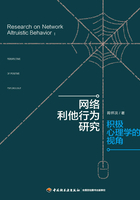
参考文献
[1]孔德.孔德早期政治著作选[M].北京:中国政法大学出版社,2003.
[2]Trivers,RL.The evolution of reciprocal altrter review of biology[M],1971,35-37.
[3]Wilson,EO. The War between the words:biological versus social evolution and some related issues:Section 2. Genetic basic of behavior-especially of altruism [J].American Psychologist,1975,458-468.
[4]杨美荣,李建明.大学生利他行为的调查分析[J].中国健康心理学杂志,2007(09):804-805
[5]Batson,C D.& Shaw,L..Evidence for altruism:Toward a pluralism of prosocial motives.Psychological Inquiry[J],1991,2(2):107-122.
[6]Taylor,S.E.,Peplau,L.A.,& Sears,D.O.社会心理学[M].谢晓非,谢冬梅,张怡玲译.北京:北京大学出版社,2004.
[7]Bar-Tal D.Altruistic motivation[J].Humbold Journal of Social Relation.1986,3,13-14.
[8]Hamilton,W.D.The Geneticl Evolution of Social Behaviour[J].Journal of Theoretical Biologe.1964,7:1-16.
[9]Deutsch,F.M.& Lamberti,D.M..Does social approval increase helping[J].Personality and Social Psychology Bulletin,1986,12:149-157.
[10]Bandura A. Social foundations of thought and action:a social cognitive theory [J].Journal of Applied Psychology,1986,12(1):169.
[11]E.Staub,Development and maintenance of prosocial behavior,International perspectives on positive morality[M].New York,Penum Press,1984.
[12]Batson C D.Prosocial Motivation:Is it ever Truly Altruistic?[J].Advances in Experimental Social Psychology,1987,20:65-122.
[13]Batson,C D. The altruism question——Toward a Social Psychological Answer [J].Erlbaum:Hillsdale NJ,1991,2:108.
[14]Homans G C.Social behavior as exchange[J].American Journal of Sociology,1958,63(6):597-606.
[15]夏学奎.整合社会心理学[M].郑州:河南人民出版社,1998.
[16]丁道群,沈模卫.人格特质、网络社会支持与网络人际信任的关系[J].心理科学,2005,28(2):300-303.
[17]Alton Christian Cadenhead,Charles L. Richman. The effects of interpersonal trust and group status on prosocial and aggressive behaviors[J].Social Behavior and Personality,1996,24(2):169-184.
[18]Penner.L A,Dovidio.J F,Piliavin.J A,et al.Prosocial Behavior:Multilevel Perspectives[J].Annual Review of Psychology,2005,56(1):365-392.
[19]Galinsky,A.D.,Ku,G.,&Wang,C.S.Perspectivetaking and self-other overlap:Fostering social bonds and facilitatingsocial coordination[J].Group Processes&Intergroup Relations,2005,8(2):109-124.
[20]Hoffman,M. L. Empathy and moral development:Implicationsfor caring and justice[M].Cambridge:Cambridge University Press,2000.
[21]孙炳海,苗德露,李伟健,等.大学生的观点采择与助人行为:群体关系与共情反应的不同作用[J].心理发展与教育,2011,27(5):491-497.
[22]Moore C,Barresi J,Thompson C.The Cognitive Basis of Future-oriented Prosocial Behavior[J],Social Development,1998,7(2):21.
[23]Hoffman,Martin L,Developmental synthesis of affect and cognition and its implications for altruistic motivation[J].Developmental Psychology,1975,11(5):607-622.
[24]Crusec J E,Lytton H. Socialization and the Family [M]. Social Development,1988.
[25]Kohlberg L.Development of moral character and moral ideology[M].New York:Russel Sage Foundation,1964.
[26]Rushton,J.P.The altruistic personality,in J.P.Rushton & R.M.Serrentino,Altruism and helping behavior[M],Hills-dale,NJ:Erlbaum.1981.
[27]Eisenberg N.,Fabes,R. A. Contemporaneous and longitudinal prediction of children's sympathy from disposition regulation and emotionality [J]. Developmental Psychology,1998,4:910-924.
[28]Eisenberg N.,P.A.Miller,et al.Prosocial Development in A Longituduinal Study [J].Developmental Psychology,1991,27:849-857.
[29]Isen,A.M.,& Levin,P.L.The effect of feeling good on helping:Cookies and kindness [J]. Journal of Personality & Social Psychology,1972,21(3):384-388.
[30]姜宁宁.新社会组织研究的行动主义视角[J].行政论坛,2016,(6):66-70.
[31]Forgas J P. On feeling good and getting your way:mood effects on negotiator cognition and bargaining strategies [J]. J Pers Soc Psychol,1998,74(3):565-577.
[32]何华容,丁道群.内疚:一种有益的负性情绪[J].心理研究,2016,9(1):3-8.
[33]安连超,张守臣,王宏,马子媛,赵建芳.共情对大学生亲社会行为的影响:道德推脱和内疚的多重中介作用[J].心理学探新,2018,38(04):350-355.
[34]丁凤琴,纳雯.真实急病情境下共情对大学生慈善捐助的影响:有调节的中介效应[J].心理发展与教育,2015,31(06):694-702.
[35]Cohen D&Strayer J.Empathy in conduct-disorder and comparison youth[J]. Developmental Psychology,1996,32(6):988-998.
[36]李燕,王燕,韩剑童.护理本科生共情与情绪智力关系的研究[J].护理学杂志.2012,(04).
[37]Rushton J P.Social Learning Theory and the Development of Prosocial Behavior [J].Development of Prosocial Behavior,1982:77-105.
[38]黄希庭.人格心理学[M].杭州:浙江教育出版社,2002.
[39]郑显亮,顾海根.人格特质与网络利他行为:自尊的中介作用[J].中国特殊教育,2012(2):69-75.
[40]姚娇娇.大学生心理控制源对利他行为的影响[J].中国电力教育,2009(10):155-156.
[41]叶华奇.当代大学生社会责任心调查研究[J].兰州教育学院学报,2011,27(1):56.
[42]李丹.儿童亲社会行为发展研究述评[J].心理科学,2001,24(2);202-204.
[43]郑奥文,张璐琨,陈晓梅,等.面部表情对利他行为影响的实验研究[J].中国健康心理学杂志,2013,21(2):305-306.
[44]Weiner B. An attributional model of motivation and emotion [M]. NewYork:Springer-Verlag,1986,31-34.
[45]吴睿,郭庆科,李芳.内隐和外显测量对利他行为的预测:来自IAT和BIAT的证据[J].心理学探新,2018,38(04):356-362.
[46]B. Latane & J. Darley. The UnresponsiveBystander:Why Doesn't He Help?[M].New York:Appleton-Century-crofts.1970.
[47]Li J,Chen Y,Huang X.Materialism Moderates the Effect of Accounting for Time on Prosocial Behaviors[J].The Journal of Social Psychology,2015,155(6):576-589.
[48]Shelly E.Taylor,Letitia Anne Peplau,David O.Sears.Social Psychology[M].Peking University Press,2004,383-400.
[49]郑显亮,顾海根.国外利他行为影响因素的研究综述[J].外国中小学教育,2010,(9)51-55.
[50]K.E.Mathew and L. K. Canon. Environmental Noise Levels as a Determinant of Helping Behavior[J].Journal of Personality and SocialPsychology,1975,Vol. 32,571-577.
[51]寇彧,唐玲玲.心境对亲社会行为的影响[J].北京师范大学学报(社会科学版),2004,(5):44-49.
[52]危敏.大学生网络亲社会行为的研究[D].山东:山东大学,2007.[2019-4-9]http://kns.cnki.net/KCMS/detail/detail.aspx?dbcode=CMFD&dbname=CMFD2007&filename=2007086476.nh&v=MjE0NThNMUZyQ1VSTE9mWStabUZ5M2hVci9LVjEyN0diT3dHTlhMcVpFYlBJUjhlWDFMdXhZUzdEaDFUM3FUclc=
[53]王小璐,风笑天.网络中的青少年利他行为新探[J].广东青年干部学院学报,2004,18(3):16-19.
[54]彭庆红,樊富珉.大学生网络利他行为及其对高校德育的启示[J].思想理论教育导刊,2005(12):49-51.
[55]郑显亮.大学生网络利他行为:量表编制与多层线性分析[D].上海:上海师范大学,2010. [2019-4-9]http://kns.cnki.net/KCMS/detail/detail.aspx?dbcode=CDFD&dbname=CDFD0911&filename=2010084043.nh&v=MjQ2NzFJckpFYlBJUjhlWDFMdXhZUzdEaDFUM3FUcldNMUZyQ1VSTE9mWStabUZ5M2hWcnZPVjEyNkhyT3dHdEg=
[56]岳玉洁.特质移情和同情情绪对大学生网络利他行为的影响[D].湖北:华中师范大学,2015. [2019-4-9]http://kns.cnki.net/KCMS/detail/detail.aspx?dbcode=CMFD&dbname=CMFD201601&filename=1015445679.nh&v=MjIxOTQzaFZMck5WRjI2RzdlOEc5ZkxwcEViUElSOGVYMUx1eFlTN0RoMVQzcVRyV00xRnJDVVJMT2ZZK1ptRnk=
[57]杨燕.大学生现实利他行为对网络利他行为的影响:网络社会支持与网络人际信任的作用[D].湖北:华中师范大学,2017.[2019-4-9]http://kns.cnki.net/KCMS/detail/detail.aspx?dbcode=CMFD&dbname=CM-FD201802&filename=1017252668.nh&v=MDYyNjg3RGgxVDNxVHJXTTF-GckNVUkxPZlkrWm1GeTNoV3J2TVZGMjZHYkc5SE5mS3A1RWJQSVI4ZVgxTHV4WVM=
[58]郭玉锦,王欢.网络社会学(第2版)[M].北京:中国人民大学出版社,2010.
[59]丁迈,陈曦.网络环境下的利他行为研究[J].现代传播,2009(3):35-37.
[60]Wallace,P. M.. The psychology of the Internet [M]. Cambridge University Press,1999.
[61]Wright,M. F.,&Li,Y. The associations between young adults' face-to-face prosocial behaviors and their online prosocial behaviors [J]. Computers in Human Behavior,2011,27(5):1959-1962.
[62]Handy,F.Reputation as collateral:An economic analysis of the role of trustees of nonprofits [J]. Nonprofit and Voluntary Sector Quarterly,1995,24(4):293-305.
[63]程乐华.网络心理行为公开报告[M].广州:广东经济出版社,2002.
[64]宋凤宁,黎玉兰,方艳娇,江宏.青少年移情水平与网络亲社会行为的研究[J].广西师范大学学报(哲学社会科学版),2005(03):84-88.
[65]李炜.硕士研究生网络利他行为的量表适用性及其与道德判断间关系[D].华东师范大学,2012.[2019-4-9]http://kns.cnki.net/KCMS/detail/detail.aspx?dbcode=CMFD&dbname=CMFD2012&filename=1012439819.nh&v=Mjc5NTh2S1ZGMjZITGU3RjluTnBwRWJQSVI4ZVgxTHV4WVM3RGgxVDNxVHJXTTFGckNVUkxPZlkrWm1GeXprVTc=
[66]Seligman M E,Csikszentmihalyi M.Positive Psychology:an Introduction[J]. American Psychologist,2000,(1):5-14.
[67]张倩,郑勇.美国积极心理学介评[J].心理学探新,2003,(3):6-10.
[68]Seligman.Authentic happiness[M].New York:FreePress,2002.
[69]Ryff C D,Singer B H,LoveG D. Positive health:connecting we-beingwith biology[J].PhilosophicalTransactions of the Royal Society Biological Sciences. 2004,359:383-1394.
[70]Diener E,Eunkook S,Richard L.et al.Subjective well-being:three decades of progress[J].Psychological Bulletin,1999,125(2):276-302.
[71]Diener E.Subjective Well-being.Psychological Bulletin,1984,95:542-575.
[72]Seligman M.Positive psychology,positive preventionand positive therapy[M].Handbook of positive psychology,2002.
[73]任俊.积极心理学[M].上海:上海教育出版社,2006.
[74]Cillessen A H N.So ciometric status,social self-perceptions,and the development of school adjustment inmiddle childhood[M].Paper presented at the biennial meetingof the society fo r research in ChildDevelopment,1997.
[75]赵冬梅,周宗奎.儿童同伴交往中的攻击行为:文化和性别特征[J].心理科学,2010,(1):144-146.
[76]孙晓军,周宗奎,范翠英,柯善玉.童年中期不同水平的同伴交往变量与孤独感的关系[J].心理科学,2009(3):567-570.
[77]王树涛.学校氛围对留守与非留守儿童情绪智力影响的比较及启示[J].现代教育管理,2018,(04):100-105.
[78]Bandura A. Social Learning theory [M]. Englewood Cliffs,N. J. Prentic-Hall,1977.